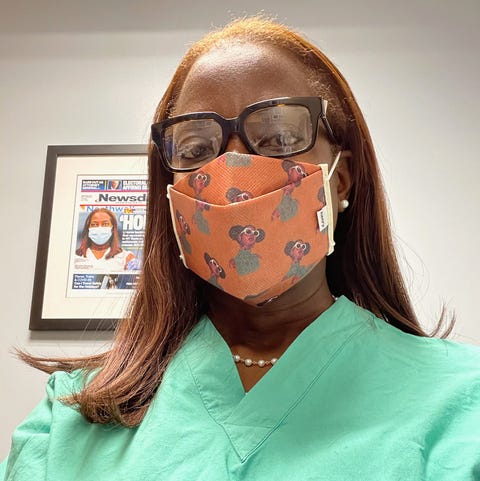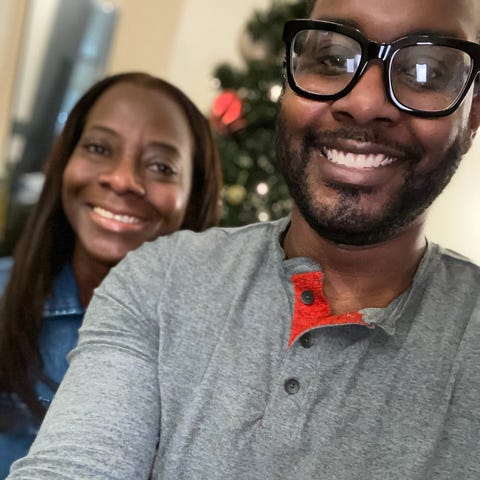Sandra Lindsay, director of nursing for critical care at Northwell Health’s Long Island Jewish Medical Center, was the first person in the U.S. to receive a COVID-19 vaccine. Below, the 52-year-old reflects on finally getting to meet her new grandson—and why we should all trust the science behind the vaccine.
Over the last year, I experienced unbelievable emotional stress in my job as a nurse. But, like so many others, there was also stress at home. My beautiful baby grandson, Kadeem, was born prematurely on March 4, 2020. He was beautiful but fragile, and I was so afraid of infecting him with COVID-19 that I kept my distance for months. Instead, I self-isolated and fell into a strict new routine: work, home, supermarket.
It has been very difficult. Sometimes, I felt an almost unbearable kind of loneliness.
In December, when the vaccine needle finally pierced my skin, hope also shot into my arm. For so long, fear had replaced hope. But on that day, it came back and pushed fear away. Not only was I protecting myself and my family—especially Kadeem—but I was taking a step forward to heal our nation. If we all do our part, we can get through this. I know it. It might take a collective effort, but we have to. We can’t live in hurt, pain, and loneliness anymore.
This content is imported from YouTube. You may be able to find the same content in another format, or you may be able to find more information, at their web site.
I always wanted to become a nurse. In Jamaica, where I grew up, nurses are well-respected. They’re like matriarchs of the hospital. People look up to them, and it’s a very prestigious role.
I was six years old when my grandmother developed a chronic illness, and I took great pride in administering her medications and checking her blood glucose levels. As her eyes began to deteriorate, I read to her. It was one of the great joys of my life to care for her.
When I migrated to New York in 1986, I worked a few odd jobs before becoming a nurse’s aid. Graduating nursing school a few years later was the proudest moment of my life. Since then, I’ve obtained my bachelor’s degree, master’s degree, and now, in a few weeks, I will finish up my doctorate in health sciences.
The first time I heard about COVID-19 was on CNN. It seemed so far away—all the way in China—but I knew it would only be a matter of time before the virus came to the U.S. What I did not know was the devastating impact it would have on the entire world.
I spent New Year’s in Jamaica and by the time I returned home in January, one of our physicians was wearing a mask at work. She told me, “This is not going to be good.” She was right, things sped up rapidly. By March we were expanding our ICUs because we couldn’t keep up with all the incoming COVID-19 patients. It was like we were ambushed overnight.
They came to us and rapidly deteriorated. We ran around making sure everyone had a bed and that our sickest patients were being cared for. As patients passed away, more were waiting to come in and fill those beds. Hundreds of thousands of patients. Over and over again.
I leaned on my fellow nurses for support. We depended on each other, there was no other way. We laughed together. We cried together. We needed each other.
After Kadeem was born, his father, my son Avery, called three times a day and sent videos from the NICU. One day it was all too much for Avery and he broke down crying. In that moment, I had to comfort my son without physically being there.
After four months in the NICU, I finally met Kadeem. He was the most beautiful thing I’d ever seen. Leaving him afterward was one of the hardest things I’ve ever done.
Kadeem is doing great now. He’s crawling, holding onto things, and meeting his milestones. We’re all still very protective, of course, because he had to fight for his life for so long. He is fragile, and we don’t want to expose him to anything dangerous that might land him back in the hospital. The vaccine gives us some reassurance that he will be safe in this world once again.
Communities of color can be skeptical about the vaccine, due to historical events and current disparities in healthcare. People are also skeptical about the speed at which the vaccine was developed. What I want them to know is that, as a woman of color, I know about these harmful practices. I never want to dismiss or be judgmental about people’s feelings, but many safeguards have been put in place to ensure that vulnerable populations are protected. I trust the science. It’s our best defense against fighting this virus.
I encourage everyone to take a moment and reflect on where we are at this point, and the number of lives this virus has taken. It should have people reconsidering the part they are playing to end this pandemic. The people that are dying? They are our friends, neighbors, moms, fathers, aunts, uncles, grandmothers, grandfathers, and children.
Ask yourself: Are you doing your part?
This interview has been lightly edited and condensed for clarity.
This story is part of ELLE’s Lost and Found: One Year in Quarantine. Click here to read all the stories in this package.
This content is created and maintained by a third party, and imported onto this page to help users provide their email addresses. You may be able to find more information about this and similar content at piano.io



